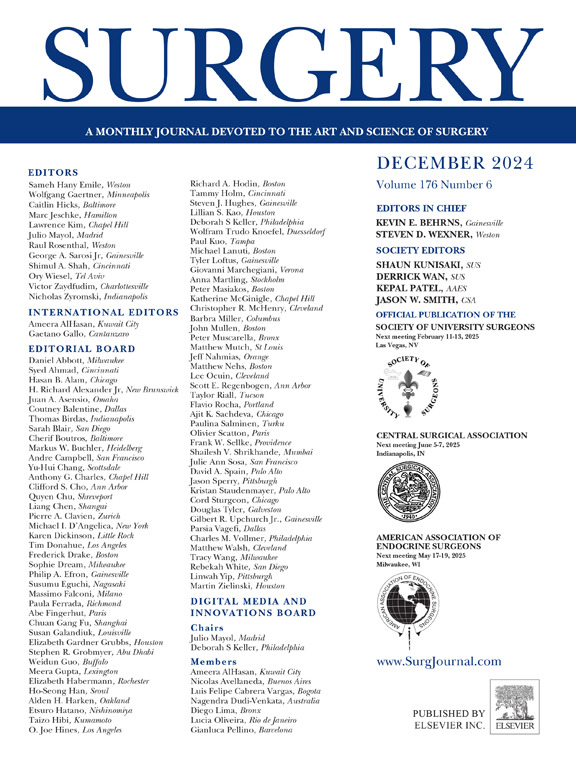The use of patient-reported outcome measures in recurrent diverticulitis
IF 3.2
2区 医学
Q1 SURGERY
引用次数: 0
Abstract
Background
National guidelines for elective colectomy for uncomplicated diverticulitis have changed to a patient-centered approach. Patient-reported outcome measures, such as the Diverticulitis Quality of Life Instrument, may be helpful to determine who will benefit from elective colectomy for diverticulitis.
Methods
We performed a prospective observational cohort study to investigate whether greater Diverticulitis Quality of Life Instrument scores (indicating more severe disease burden) would be associated with increased likelihood of electing to undergo colectomy for recurrent diverticulitis. Adult patients ≥18 year old seen in consultation for uncomplicated diverticulitis at a tertiary referral medical center from March 2021 to August 2023 were included for analysis. The primary outcome of interest was the decision to proceed with elective colectomy vs. continued medical management.
Results
Of the 70 patients included, 48 (68.6%) elected for medical management and 22 (31.4%) had elective surgery planned or completed during the study period. The mean overall Diverticulitis Quality of Life Instrument scores were 4.6 (standard deviation, 1.8) for the medical management group and 5.3 (standard deviation, 1.2) for the elective colectomy group. An adjusted multivariable analysis showed an odds ratio of 1.39 (confidence interval, 1.03–1.89, P = .04) for electing surgical management with one-unit greater baseline Diverticulitis Quality of Life Instrument overall score and an odds ratio of 1.36 (confidence interval, 1.03–1.78, P = .03) for one-unit greater baseline Diverticulitis Quality of Life Instrument score in the subdomain of behavior.
Conclusion
We observed significantly greater baseline overall Diverticulitis Quality of Life Instrument scores and scores in the subdomain of behavior in patients who chose to pursue elective colectomy after consultation for recurrent diverticulitis.
复发性憩室炎患者报告结果测量的应用
背景:针对非复杂性憩室炎的选择性结肠切除术的国家指南已经改为以患者为中心的方法。患者报告的结果测量,如憩室炎生活质量仪器,可能有助于确定谁将从憩室炎选择性结肠切除术中获益。方法:我们进行了一项前瞻性观察队列研究,以调查憩室炎生活质量评分(表明更严重的疾病负担)是否与复发性憩室炎患者选择结肠切除术的可能性增加有关。纳入了2021年3月至2023年8月在三级转诊医疗中心因无并发症憩室炎就诊的≥18岁成年患者进行分析。主要关注的结局是决定继续择期结肠切除术还是继续药物治疗。结果入选的70例患者中,48例(68.6%)接受了内科治疗,22例(31.4%)在研究期间计划或完成了择期手术。医疗管理组憩室炎生活质量评分平均为4.6(标准差1.8),择期结肠切除术组平均为5.3(标准差1.2)。一项调整后的多变量分析显示,憩室炎生活质量仪器总体评分基线高一个单位时选择手术治疗的比值比为1.39(置信区间,1.03-1.89,P = 0.04),行为子领域憩室炎生活质量仪器评分基线高一个单位时选择手术治疗的比值比为1.36(置信区间,1.03-1.78,P = 0.03)。结论:我们观察到,复发性憩室炎会诊后选择择期结肠切除术的患者,其总体憩室炎生活质量评分和行为亚域评分的基线均显著提高。
本文章由计算机程序翻译,如有差异,请以英文原文为准。
求助全文
约1分钟内获得全文
求助全文
来源期刊

Surgery
医学-外科
CiteScore
5.40
自引率
5.30%
发文量
687
审稿时长
64 days
期刊介绍:
For 66 years, Surgery has published practical, authoritative information about procedures, clinical advances, and major trends shaping general surgery. Each issue features original scientific contributions and clinical reports. Peer-reviewed articles cover topics in oncology, trauma, gastrointestinal, vascular, and transplantation surgery. The journal also publishes papers from the meetings of its sponsoring societies, the Society of University Surgeons, the Central Surgical Association, and the American Association of Endocrine Surgeons.
 求助内容:
求助内容: 应助结果提醒方式:
应助结果提醒方式:


